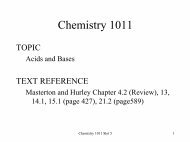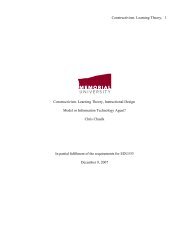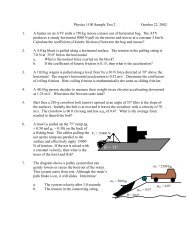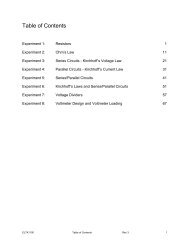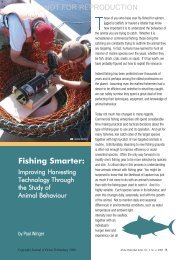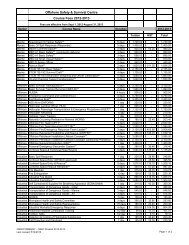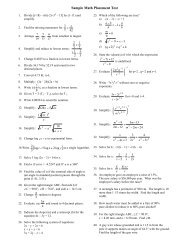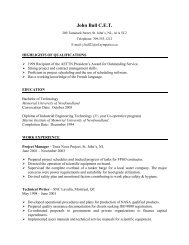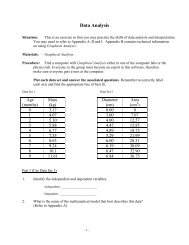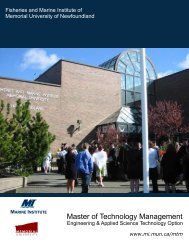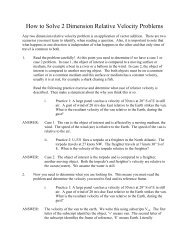Academic Calendar - Fisheries and Marine Institute - Memorial ...
Academic Calendar - Fisheries and Marine Institute - Memorial ...
Academic Calendar - Fisheries and Marine Institute - Memorial ...
You also want an ePaper? Increase the reach of your titles
YUMPU automatically turns print PDFs into web optimized ePapers that Google loves.
ACADEMIC POLICIES AND REGULATIONS<br />
iv)<br />
severe back pain over a two month period would likely have<br />
a more adverse effect on studies than a single episode of<br />
back pain requiring bed rest for a week.)<br />
the fitness of the student to resume studies (it is in the<br />
student’s best interest not to return to his/her studies<br />
prematurely.)The <strong>Institute</strong> respects the privacy of all<br />
students <strong>and</strong>, therefore, the confidentiality of all material<br />
contained in medical notes.<br />
• Students claiming bereavement as grounds for an appeal<br />
must provide proof of death <strong>and</strong> evidence of a close personal<br />
relationship between themselves <strong>and</strong> the deceased.<br />
• The members of the Appeals Committee do require substantial<br />
information about the reasons for the appeal in order to make<br />
their decisions. However, the committee also recognizes the<br />
student’s rights to confidentiality. With this in mind, a student<br />
may discuss the reasons for his or her appeal with the <strong>Institute</strong><br />
counselor, who, with the student’s permission <strong>and</strong> provided<br />
sufficient reasons exist, may then write a letter to the committee<br />
confirming that there were sufficient grounds for an appeal<br />
without disclosing the special personal <strong>and</strong> confidential details<br />
of the case.<br />
• In cases where a student wishes to appeal a decision of the<br />
Appeals Committee of the <strong>Marine</strong> <strong>Institute</strong> <strong>Academic</strong> Council,<br />
the appeal shall be directed to the Executive Committee of<br />
<strong>Academic</strong> Council. The Executive Committee shall determine if<br />
there is any further evidence or grounds to amend the previous<br />
decisions of the Appeals Committee.<br />
• In all cases, written appeals must be made no later than two<br />
weeks after the decision of the Appeals Committee is made<br />
known to the student. Failure to do so will result in the forfeiture<br />
of the right to appeal.<br />
20. ACADEMIC MISCONDUCT<br />
These rules on <strong>Academic</strong> Misconduct apply to students<br />
registered in courses in any non-degree <strong>Marine</strong> <strong>Institute</strong> program.<br />
Students enrolled in the degree-level courses should consult<br />
the <strong>Memorial</strong> University <strong>Calendar</strong> for regulations governing<br />
undergraduate <strong>and</strong> graduate degree students.<br />
20.1 General Procedures<br />
20.1.1 Reporting Offenses:<br />
The <strong>Marine</strong> <strong>Institute</strong> values academic honesty highly. When any<br />
member of the <strong>Marine</strong> <strong>Institute</strong> community (faculty, staff, student)<br />
has reason to believe that an academic offense has been<br />
committed, he/she is obliged to report the matter verbally without<br />
delay to the appropriate person immediately.<br />
In the case of a final examination, the appropriate person shall be<br />
the chief invigilator. In the case of a classroom test, assignment,<br />
project, or other academic work, the appropriate person shall<br />
be the person for whom the work is being done or the person<br />
supervising the work. The person for whom the work is being<br />
done shall take immediate action to stop the offense, if possible.<br />
He/she shall promptly inform the student’s School Head of the<br />
offense <strong>and</strong> the action taken.<br />
In the case of a final examination, the report shall be made to<br />
the Supervisor of Examinations who will prepare a report to the<br />
appropriate School Head once the circumstances of the matter<br />
have been determined. A verbal report shall be confirmed in<br />
writing as soon as possible.<br />
All references to School Head in this policy refer to the Head of<br />
the School with responsibility for the program of study in which<br />
the student accused of academic misconduct is registered.<br />
20.1.2 Resolution of Allegations:<br />
1. In the case of work, other than final exams, which<br />
constitutes less than 10% of the final grade for the course in<br />
question, an instructor may determine that a student may be<br />
guilty of either cheating or plagiarism. Such an offense shall<br />
be considered a minor offense. In such cases, an instructor<br />
may apply a grade reduction penalty up to <strong>and</strong> including the<br />
reduction of the grade for the portion of work in question to 0%.<br />
In such cases, the instructor shall submit a brief written report<br />
to the School Head documenting the nature of the incident,<br />
the evidence used to determine that the student cheated,<br />
<strong>and</strong> the action taken to resolve the issue. For minor offenses,<br />
an instructor may choose to have such incidents of alleged<br />
academic misconduct resolved by the student’s School Head. In<br />
all cases other than those resolved in step one above, the faculty<br />
member, witness to the event or, in the case of final examinations,<br />
the Supervisor of Examinations, shall prepare <strong>and</strong> submit a written<br />
report to the School Head.<br />
2. The School Head shall interview each person involved<br />
separately to establish the facts of the matter <strong>and</strong> the appropriate<br />
steps to follow. Those to be interviewed shall include the<br />
student(s) in question, the instructor for the course in question,<br />
the witness to the act of academic misconduct, <strong>and</strong>, in the case<br />
of final examinations, the Chief Invigilator <strong>and</strong> the Supervisor of<br />
Examinations. All interviews <strong>and</strong> the review of all documentation<br />
shall be completed <strong>and</strong> a decision shall be made by the School<br />
Head within ten (10) business days of the occurrence of the<br />
alleged offence.<br />
3. If upon completion of step 2 above the School Head<br />
determines that there is not enough evidence to determine that a<br />
student is guilty of an act of academic misconduct, the matter is<br />
resolved <strong>and</strong> the student <strong>and</strong> instructor are notified in writing of<br />
the outcome.<br />
4. If, upon completion of step 2 above, the School Head<br />
determines that there is enough evidence to determine that an<br />
act of academic misconduct was committed by a student, he<br />
or she will assess the circumstances <strong>and</strong> severity of the act of<br />
dishonesty <strong>and</strong> apply the appropriate penalties, as outlined below<br />
in the section concerning Penalties. The School Head shall notify<br />
the student in writing of the outcome of the case within five (5)<br />
business days of his/her decision.<br />
20.2 <strong>Academic</strong> Offenses<br />
Students who commit acts of academic misconduct, including<br />
but not limited to the following offenses, shall be subject to<br />
disciplinary action by the <strong>Marine</strong> <strong>Institute</strong>.<br />
20.2.1 Cheating:<br />
For assignment, tests, projects, reports, laboratories <strong>and</strong><br />
examinations, cheating means copying from another student’s<br />
work, or allowing a student to copy from one’s own work;<br />
36



